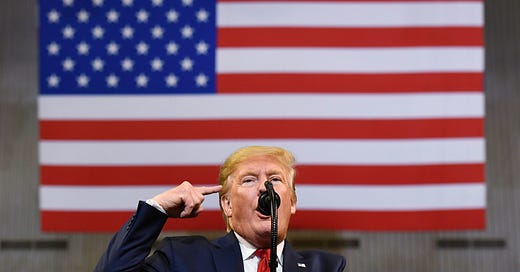The GOP Rolls Out Trump’s “It Wasn’t Me” Defense
The success or failure of the attempt to remove President Donald Trump from office may come down to degrees of separation.
Two weeks ago, I wrote that President Trump’s defense would inevitably boil down to “It Wasn’t Me.”
Aside from the summary of the July 25 phone call—which hasn’t moved congressional Republicans out of their defensive crouch—there was precious little in the public record laying the aid-for-dirt extortion of Ukraine directly at the feet of Donald Trump.
This week Trump’s defenders started to execute that maneuver.
Trump’s primary congressional attack dog, Ohio congressman Jim Jordan, was the most skilled proponent of the attempt to separate Trump from the now undeniable fact that individuals working on Trump’s behalf attempted to extort a public statement by Ukraine’s president that the Bidens were under investigation for corruption.
Jordan’s comparison of some of the most damning testimony to “church prayer chains” made the key point: Other than the July 25 phone call, there’s little first-hand testimony that Trump himself directed the extortion scheme.
But one piece of new evidence tying Trump directly to the scheme came out during Wednesday’s testimony from State Department official George Kent and Ukraine diplomat William Taylor. Taylor testified that a member of his staff overheard a telephone conversation between E.U. Ambassador Gordon Sondland and Trump the day after Trump’s July 25 phone call with Ukraine president Zelensky. According to Taylor, the aide overheard Trump asking Sondland about “the investigations.” Sondland told Trump that the Ukrainians were “ready to move forward” with them.
It is too early to know how solid this new lead is. There will need to be follow-up interviews. Presumably the aide will have to testify. If all he heard from Trump was a reference to “the investigations,” it won’t have much impact. If he heard something specifically linking the investigations to the withheld aid, it could become a smoking gun.
The real story here, though, isn’t the relative dearth of evidence linking Trump directly to the extortion scheme.
It’s the reason that the evidence isn’t available.
Think about it. Trump’s defenders are arguing that all the evidence against Trump is second-hand at the same time that Trump is ordering the witnesses who have first-hand information—Mick Mulvaney, Gordon Sondland, Rudy Giuliani, possibly Rick Perry, John Bolton, and others—not to testify.
That’s a nifty Catch-22.
Enter the courts.
The first-hand witnesses—with the possible exception of Bolton—won’t testify unless a court orders them to. So the fate of the impeachment process may turn on whether the courts can get it together to rule on this issue in time to allow testimony of first-hand witnesses to be of use in the proceedings. And whether Trump and the witnesses obey their rulings.
In the absence of additional first-hand testimony linking Trump directly to the extortion scheme, we’re likely to stay right where we are now: House Democrats will impeach Trump without Republican support, and Senate Republicans will refuse to remove him from office. One or two Republican senators may vote for removal, possibly even enough to reach a majority. But the vote will fall far short of the two-thirds super-majority required for removal.
If the first-hand witnesses are ultimately required to testify, they will face their own Catch-22. They can’t implicate Trump without implicating themselves. So don’t expect them to come to the rescue.
And if any of them do link Trump directly to the scheme, it will be his word against theirs.
In the end, of course, how congressional Republicans react to this will depend mostly on the flow of public opinion. If the “impeach/remove” needle ticks up even a few more points, especially in red and swing states, they may stop pretending that they believe everything Trump says.





